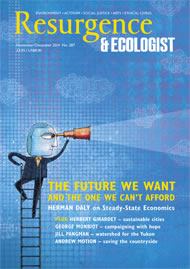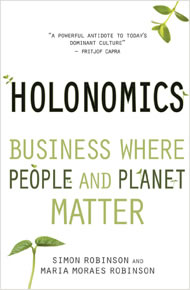Much has been written recently about the increasingly desperate need for radical approaches to business, leadership, social change, politics and economics. We have Einstein’s words ringing in our ears in recognising that we cannot face today’s problems with the same thinking that created them. Yet when it comes to overhauling our way of engaging in business, we all too often find ourselves falling short, restricted by habitual frames. To see ‘outside the box’ in a systemic way is most challenging, yet nothing less is now called for.
Holonomics unpacks what it means to think differently in practice, and is radical in its approach in going to the root of our mechanistic worldview. The authors of this book provide an eloquent path for the reader to consciously harmonise rationalistic logic with intuitive, organic phenomenological logic. The book is structured in three easy-to-digest parts: Part One, The Dynamics of Seeing, explores the ‘what’ and the ‘how’ of new ways of thinking; Part Two, The Dynamics of Nature, explores the insightful work of Goethe, Wolfgang Schad, Ilya Prigogine, Charles Darwin, Lynn Margulis and others on perceiving relationships within and across living systems; Part Three, The Dynamics of Business, provides inspiring examples of applied ‘holonomics’ for leadership and organisational management.
The challenge now facing many us is how to encourage those in business and beyond to embrace an ecological perspective where intrinsic and extrinsic dimensions of complex systems are understood. The authors discuss “authentic wholes” where the emergence of living systems is both intuited and rationally understood; with this awareness comes a transformation beyond the mechanistic mentality, whereupon we empathically interrelate as well as rationally abstract. This radically alters how we attend to reality, enabling us to transcend the illusion of separation created by Cartesian rationalism. Not only does it alter our intellectual understanding of sustainable business, but also it unlocks an inherent wisdom flowing throughout Nature. And so we find, through the techniques and practical suggestions provided throughout the book, that we can shift into being inspired by AND living in harmony with Nature – a radical sustainability.
The authors are keen to point out the benefits to business of understanding this shift: creativity, innovation, collaboration, problem solving, resilience, sense of purpose, improved morale; all are high priorities for forward-thinking organisations wishing to thrive in the volatile times ahead. And they note that there is no more successful business consultant than Nature. Having worked as a management consultant advising a great variety of organisations for many years, I could not agree more. Biomimicry, for instance, is increasingly being taken up in business strategy and operations, yet what is often so vitally overlooked is a ‘holonomic’ approach of understanding and applying Nature’s wisdom. In our rush to solve today’s problems, we rarely challenge yesterday’s thinking that created them, and so we copy Nature’s forms and patterns in an all too analytic and atomistic way, missing the deeper wisdom Nature affords us – the recognition that organisations are living systems, best understood through the intuitive and rational logic of our heads, hearts and hands.
In facilitating our ability to perceive beyond the limitations of the prevalent paradigm, Holonomics provides the fertile soil from which right thought and right action take root, ensuring that our sustainability solutions are freed from the narrow-mindedness that created the problems in the first place. To this end, Holonomics asks us to question all aspects of our personal and collective habits. What Holonomics skilfully achieves is the application of the rich philosophies of phenomenology and holistic science to our daily business endeavours, and for that reason it is a groundbreaking book for those seeking to shift organisational consciousness.







